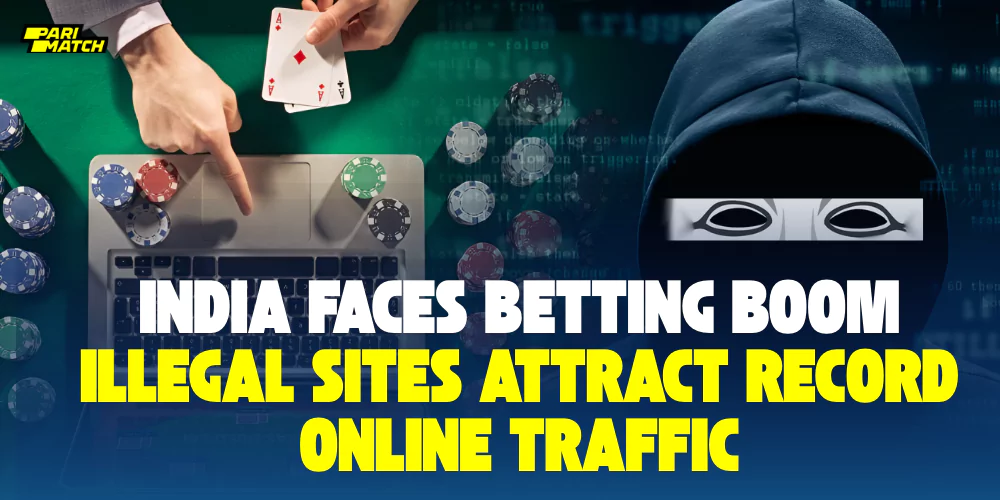The India illegal betting market is expanding at an unprecedented pace, raising concerns about the effectiveness of current enforcement measures and the risks posed to millions of users. A recent report by the Digital India Foundation estimates that four major offshore operators—Parimatch, Stake, 1xBet, and Betway—attracted a combined 1.6 billion website visits in just three months between October and December 2024.
Table of Contents
A Growing Underground Economy
The figures illustrate the depth of the India illegal betting market. Researchers found that:
- Mirror sites fuel growth: Just three Parimatch mirrors alone drew 266 million visits, suggesting that hidden access points inflate true traffic far beyond official domains.
- Social media is a gateway: Campaigns across platforms like Instagram, YouTube, and WhatsApp brought in 42.8 million visits over the same period.
- Search-driven traffic dominates: With 184 million visits coming organically from Google searches, users are not just stumbling onto these sites—they are actively looking for them.
- Referral marketing remains strong: Promotions embedded in sports and streaming websites generated 247.5 million additional visits, keeping these brands visible despite advertising restrictions.
Importantly, the report notes that these numbers exclude access via VPNs, mobile APKs, and other backdoor methods, meaning the actual reach of these sites is likely far greater.
Why India’s Crackdowns Fall Short
Despite frequent government action, illegal operators continue to thrive. Analysts attribute this to two factors:
- Aggressive digital promotion – Operators use SEO, influencers, and targeted ads to keep drawing new players.
- Evasive mirror networks – When one site is blocked, replacement domains appear within days, ensuring uninterrupted access for users.
This cat-and-mouse game has made it nearly impossible for enforcement to fully shut down operations in the India illegal betting market.

Concerns Over the Gaming Bill
Ahead of the introduction of the Promotion and Regulation of Online Gaming Bill in Parliament, the All India Gaming Federation (AIGF) warned lawmakers that poorly designed regulations may worsen the situation. In its note to Parliament, AIGF argued that overly restrictive measures could drive legitimate users into the arms of illegal platforms, undermining the government’s own objectives.
Lessons From Abroad
The report draws attention to regulatory models in Norway, Denmark, Belgium, the UK, and the US, where authorities have combined site blocking with payment restrictions, financial monitoring, and whitelisting frameworks. This layered strategy has proven more effective than blocking websites alone.
The Path Ahead
Experts say India needs a comprehensive ecosystem approach to counter the growing India illegal betting market. Key measures could include:
- Payment blocking to choke off transactions with offshore operators.
- Marketing restrictions that cut the visibility of illegal sites on social and streaming platforms.
- Licensing and whitelisting to guide players toward safe, regulated platforms.
- Awareness drives to educate users about the risks of unregulated gambling.
Without decisive, multi-pronged action, the India illegal betting market risks expanding unchecked—fuelled by digital adoption, high sports viewership, and easy access to offshore websites.
India Illegal Betting Market Surges: 1.6 Billion Visits Logged in Just Three Months
FAQs on India’s Illegal Betting Market
1. Why is India’s illegal betting market growing so quickly?
Because of high internet penetration, interest in sports, and easy access to offshore websites through mirrors, VPNs, and mobile apps. Aggressive digital marketing also attracts new users daily.
2. How much traffic did illegal betting platforms generate recently?
According to the Digital India Foundation, Parimatch, Stake, 1xBet, and Betway together recorded 1.6 billion visits in just three months (Oct–Dec 2024).
3. Why has government enforcement failed so far?
Enforcement struggles because operators create mirror sites after a ban, making them difficult to shut down. Offshore hosting and digital payments also help them evade Indian regulators.
4. What risks do users face on these platforms?
Since these platforms are unregulated, users risk losing money, data theft, addiction, and lack of legal protection in case of fraud.
5. What solutions could help India tackle this problem?
Experts recommend a multi-pronged approach: blocking illegal payments, restricting digital marketing, creating whitelists for licensed operators, and raising public awareness about gambling risks.
By: Parimatch-Global









